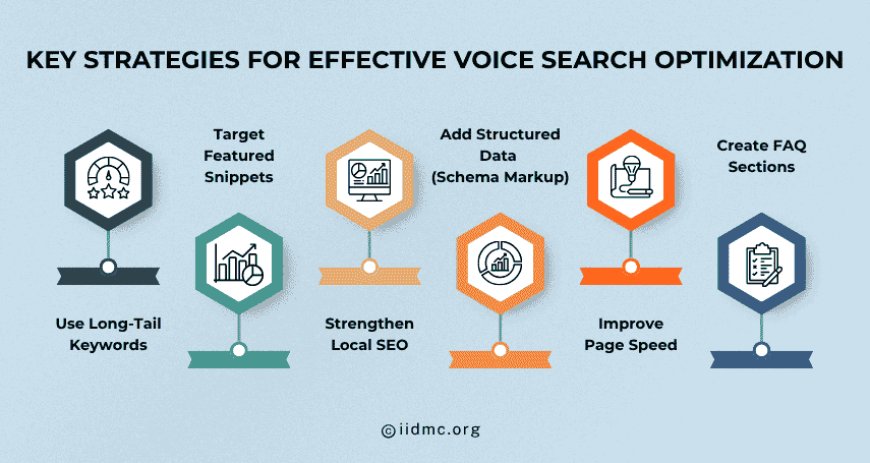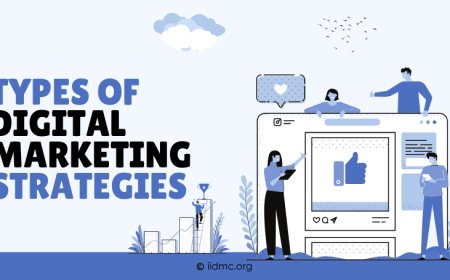Why Adapting to Voice Search Optimization Is No Longer Optional
Voice search is changing SEO. Learn why optimizing for it is a must for every digital marketer to boost rankings and stay ahead in digital marketing.

I used to think typing into Google would always be the way people search until I found it was already being overtaken. Voice search is quickly changing how people look for information online. Imagine someone asking their phone, “Where’s the best coffee shop near me?” that’s not the future; it’s happening right now.
About 20.5% of people worldwide already use voice search, and there are over 8.4 billion voice assistants in use globally. Experts also predict that more than 50% of all online searches will be voice-based by 2025. If your website only focuses on traditional text searches, you’re missing a big opportunity.
What Is Voice Search Optimization?
Voice Search Optimization (VSO) is the process of making your website’s content easily discoverable when someone uses a voice command to search. It’s about optimizing your content to sound more conversational and relevant to how people talk rather than type.
Traditional SEO focused on short, typed keywords like “best SEO course,” but now users say things like “Which is the best SEO certification course for beginners?” To match these patterns, your content must include natural language, question-based keywords, and clear, direct answers.
Key Elements of Voice Search Optimization:
-
Conversational Keywords: Focus on long-tail, question-based phrases that sound natural.
-
Mobile Optimization: Most voice searches are done on mobile, so a responsive site is essential.
-
Fast Loading Speed: Websites that load quickly are more likely to appear in voice search results.
-
Clear and Concise Answers: Use short, accurate responses to address user intent directly.
-
Local Optimization: Many voice searches include “near me” or location-based keywords, especially for local businesses.
Why Voice Search Matters in SEO and Digital Marketing
Voice search has become an important part of modern Digital Marketing because it aligns with how users naturally seek information. People are now using voice to perform tasks they once did manually — searching, shopping, and even controlling devices.
For businesses, this means your SEO strategy needs to evolve beyond traditional text searches. Google’s algorithms now favor content that provides direct, conversational answers — exactly what voice search users expect.
-
Better Visibility in Search Results: Voice-friendly pages often get featured in Google’s top positions or “featured snippets.”
-
Improved User Experience: When users find quick and accurate voice answers, they trust the source more.
-
Local Search Benefits: Voice searches often target local intent (e.g., “digital marketing course near me”).
-
Higher Conversion Rates: Voice users are often ready to take action — like enrolling in a course or buying a product.
-
Staying Ahead of Competition: Businesses that adopt Voice Search Optimization early gain a significant edge in visibility and engagement.
Key Strategies for Effective Voice Search Optimization
To succeed in voice-based searches, businesses must rethink their entire SEO and content strategy. Traditional keyword stuffing no longer works; instead, focus on providing real value through naturally written, clear, and structured content.
-
Use Long-Tail Keywords: Voice queries are often longer. Example: Instead of targeting “SEO certification,” target “Which is the best SEO certification course online?”
-
Target Featured Snippets: Structure your content using clear headings, bullet points, and concise definitions to help Google choose your answer.
-
Strengthen Local SEO: Claim your Google My Business listing and include terms like “near me” to appear in local voice results.
-
Add Structured Data (Schema Markup): Help search engines better understand your content context.
-
Improve Page Speed: Google prioritizes websites that load fast, especially for mobile and voice users.
-
Create FAQ Sections: Include question-based content that directly answers common user queries.

The Role of Local SEO in Voice Search
Local SEO plays a major role in Voice Search Optimization, especially since most voice-based queries are location-specific. Users often say phrases like “near me” or “closest to me,” making it essential for businesses to optimize their local presence.
By improving local SEO, you increase your chances of appearing in local voice results and attracting nearby customers.
How Local SEO Impacts Voice Search:
-
“Near Me” Searches: Voice assistants prioritize local listings when users search for nearby businesses or services.
-
Google My Business Optimization: Keep your GMB profile updated with correct address, contact number, and working hours.
-
Local Keywords: Include location-based terms like “digital marketing course in Bangalore” or “SEO certification in Pune.”
-
Positive Reviews: High ratings and reviews improve credibility and ranking in local search results.
-
Consistent NAP (Name, Address, Phone): Ensure your business details are consistent across directories and websites.
Local SEO helps your brand become more visible when users perform voice-based searches from their phones, making it an important component of any Digital Marketing strategy.
Common Mistakes Businesses Make in Voice Search Optimization
Even though many companies are aware of Voice Search Optimization, they often make mistakes that limit their reach and performance. Avoiding these common errors is key to ensuring your business doesn’t fall behind.
-
Ignoring Conversational Queries: Focusing only on short, traditional keywords instead of natural, voice-like phrases.
-
Neglecting Local SEO: Failing to optimize for nearby searches or not updating business listings.
-
Poor Website Speed: Slow-loading pages discourage users and reduce rankings.
-
Lack of Structured Data: Without schema markup, search engines can’t understand your content properly.
-
Outdated or Irrelevant Content: Old content that doesn’t match current user intent will perform poorly in voice search.
Tools and Techniques for Voice Search Optimization
To effectively implement Voice Search Optimization, you need the right tools and methods to analyze performance, understand user behavior, and improve rankings. These tools make it easier to optimize your content for voice assistants and track SEO progress.
Essential Tools and Techniques:
-
Google Keyword Planner: Helps find long-tail and conversational keywords commonly used in voice searches.
-
AnswerThePublic: Identifies question-based queries people use, helping you tailor content to natural speech.
-
SEMrush or Ahrefs: Tracks keyword performance, content ranking, and competition for voice search terms.
-
Google Search Console: Monitors how your content performs in search results, including voice-related traffic.
-
Schema Markup Generator: Adds structured data to your web pages, making it easier for search engines to understand your content.
-
Mobile-Friendly Test Tool: Ensures your website works smoothly on mobile, which is crucial for voice optimization.
Techniques for Better Optimization:
-
Use FAQs to address common voice queries.
-
Write in a conversational tone that reflects real-life speech.
-
Focus on page speed and responsive design.
-
Optimize metadata (titles, descriptions) with natural language.
-
Keep your content updated with new voice-friendly keywords.
Steps to Get Started with Voice Search Optimization
Starting with Voice Search Optimization doesn’t have to be complicated. It’s about understanding how people talk, what they ask, and how search engines deliver voice-based answers. Follow a clear, structured approach to make your website voice-ready.
Step-by-Step Guide:
-
Research Conversational Keywords:
-
Identify how users phrase questions related to your business.
-
Use tools like AnswerThePublic and Google’s “People Also Ask” section.
-
Optimize for Featured Snippets:
-
Provide short, direct answers to questions in your content.
-
Use bullet points, numbered lists, and clear headings.
-
Strengthen Local SEO:
-
Update your Google My Business listing.
-
Include local keywords and “near me” phrases.
-
Improve Website Speed and Mobile Friendliness:
-
Use Google PageSpeed Insights to test performance.
-
Ensure your site loads in under three seconds.
-
Add Structured Data (Schema Markup):
-
Implement schema tags to help search engines understand your content better.
-
Create Voice-Friendly Content:
-
Write in a natural, conversational tone.
-
Include FAQs to target common voice queries.
-
Monitor and Update Regularly:
-
Track your voice search performance with Google Analytics and Search Console.
-
Keep optimizing your content based on user behavior.
The Future of Voice Search in Digital Marketing
The future of Digital Marketing is heavily influenced by voice technology and artificial intelligence. As more users depend on smart assistants, voice search will continue shaping how businesses approach SEO and customer engagement.
-
AI and Personalization: Voice assistants will deliver more tailored search results using AI-driven data.
-
Multilingual Voice Search: Optimization for regional languages will open new market opportunities.
-
Integration with Smart Devices: Voice commands will extend to vehicles, home devices, and wearable tech.
-
Evolving Search Algorithms: Google and other engines will further refine how they rank voice-based content.
-
Ongoing Skill Development: Continuous learning through SEO Certification or Digital Marketing Certification will become crucial for professionals.
The Role of SEO Certifications
Learning and mastering Voice Search Optimization requires up-to-date skills and practical knowledge of how search engines operate. This is where professional certifications, such as a Digital Marketing Certification or an SEO Certification, become valuable.
Institutes like IIDMC (International Institute of Digital Marketing Certifications) play a key role in helping professionals gain the latest skills in SEO and Digital Marketing. IIDMC’s globally recognized programs are designed to equip learners with advanced techniques in search optimization, content strategy, and AI-driven marketing approaches that align with current industry needs.
By enrolling in a program from IIDMC, learners get the opportunity to stay ahead of changing digital trends and gain a strong foundation in voice-based search strategies and modern SEO practices.
Benefits of Getting Certified from IIDMC:
-
Advanced SEO Knowledge: Learn how to research, structure, and optimize content effectively for both traditional and voice-based search results.
-
Hands-On Experience: IIDMC provides real-world projects and practical assignments to help students apply their learning to real digital marketing situations.
-
Stay Current with Trends: Courses at IIDMC are updated regularly to include Google’s latest algorithm updates, ensuring your skills remain relevant.
-
Career Advancement: IIDMC certifications are recognized internationally, helping professionals earn better job opportunities and credibility in the marketing field.
-
Master Voice Search Techniques: Learn to create content optimized for featured snippets, conversational keywords, and schema markup to improve your Voice Search Optimization performance.
Adapting to voice search is now a must for anyone who wants to stay visible online. With more people using voice assistants to search for information quickly and easily, it’s important for businesses and creators to make their content simple, clear, and natural. Using conversational language helps voice assistants understand and share your content better. Voice search not only gives users a better experience but also helps you stay ahead in the fast-changing digital world.





























